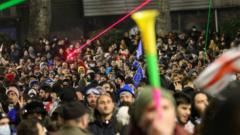Thousands of Georgians have taken to the streets for a third consecutive night, fueled by anger over the government's recent halt to European Union accession talks. Protests erupted in Tbilisi and extended to various cities, including Batumi and Kutaisi, as demonstrators confronted riot police deployed around Parliament. The situation escalated over the weekend, with authorities using water cannons and tear gas on protestors.
Protests Erupt in Georgia as EU Accession Talks Stalled

Protests Erupt in Georgia as EU Accession Talks Stalled
Mass demonstrations in Tbilisi and beyond highlight mounting discontent over government decision to pause EU negotiations.
The unrest follows assertions from Georgia's pro-European President, Salome Zourabichvili, who has announced she will remain in office pending new parliamentary elections. Despite opposition MPs alleging significant electoral fraud in last month’s elections, the newly-elected parliament is set to select her successor on December 14, a move Zourabichvili contests as "illegitimate."
Dissatisfaction with the government's direction is palpable, as hundreds of civil servants have voiced their opposition to halting EU negotiations, citing a betrayal of the nation’s interests. Several ambassadors, in solidarity with protestors, have resigned, further emphasizing the gravity of the situation.
Critics accuse the ruling Georgian Dream party of shifting the country’s focus from European integration towards Russia. This tension was exacerbated after the European Parliament denounced the recent elections as part of a "worsening democratic crisis." Following this, the Georgian Prime Minister announced a moratorium on EU discussions until at least 2028.
Public figures, including writers and journalists, are demanding the autonomy of Georgia's public broadcaster, which they claim propagates ruling party narratives. They insist on the need for reform to eliminate influence from external powers and governmental pressure.
Opposition parties are banding together, decrying the legitimacy of the current regime and calling for fresh elections under international oversight. The U.S. has voiced its disapproval of the police's response to the protests, urging both sides to maintain peace amid escalating tensions.
Clashes have resulted in injuries among both demonstrators and law enforcement, with officials claiming that violence has marred peaceful assemblies. Prime Minister Irakli Kobakhidze attributed injuries of police to protesters, stating that armed attacks, including Molotov cocktails, were used against officers.
As the situation develops, both the Georgian populace and the international community remain watchful, anticipating the government’s next steps in the face of growing unrest.
Dissatisfaction with the government's direction is palpable, as hundreds of civil servants have voiced their opposition to halting EU negotiations, citing a betrayal of the nation’s interests. Several ambassadors, in solidarity with protestors, have resigned, further emphasizing the gravity of the situation.
Critics accuse the ruling Georgian Dream party of shifting the country’s focus from European integration towards Russia. This tension was exacerbated after the European Parliament denounced the recent elections as part of a "worsening democratic crisis." Following this, the Georgian Prime Minister announced a moratorium on EU discussions until at least 2028.
Public figures, including writers and journalists, are demanding the autonomy of Georgia's public broadcaster, which they claim propagates ruling party narratives. They insist on the need for reform to eliminate influence from external powers and governmental pressure.
Opposition parties are banding together, decrying the legitimacy of the current regime and calling for fresh elections under international oversight. The U.S. has voiced its disapproval of the police's response to the protests, urging both sides to maintain peace amid escalating tensions.
Clashes have resulted in injuries among both demonstrators and law enforcement, with officials claiming that violence has marred peaceful assemblies. Prime Minister Irakli Kobakhidze attributed injuries of police to protesters, stating that armed attacks, including Molotov cocktails, were used against officers.
As the situation develops, both the Georgian populace and the international community remain watchful, anticipating the government’s next steps in the face of growing unrest.





















